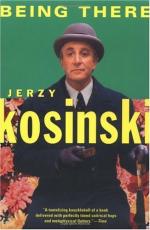
|
| Name: _________________________ | Period: ___________________ |
This test consists of 15 multiple choice questions and 5 short answer questions.
Multiple Choice Questions
1. What does Grunmann find out about Chance's past at the President's request?
(a) There are no records on him at all.
(b) He was a professional gardener.
(c) His real name is Chance, not Chauncey Gardiner.
(d) He lived for years with the Old Man.
2. What favor does Mr. Rand ask of Chance when he sees him after the program?
(a) He asks Chance if he was nervous during the interview.
(b) He asks Chance to marry EE after he dies.
(c) He asks Chance how he'd never heard of him before.
(d) He asks Chance to escort EE to a United Nations reception.
3. When Tom Courtney of the New York Times telephones Chance to interview him, what does Chance say?
(a) He tells Mr. Courtney that he prefers to speak about gardening and how important it is.
(b) He tells Mr. Courtney about the Old Man's house and how he was asked to leave.
(c) He answers all of Mr. Courtney's questions.
(d) He has no comment other than to say he enjoyed his meeting with the President.
4. What gets Chance interested in the book Stiegler speaks of?
(a) Stiegler tells Chance that books are like television.
(b) Chance never gets interested in the book.
(c) Stiegler compares publishing to a garden.
(d) Stiegler compares publishing to television.
5. What are the President's thoughts about the government in relation to Gardiner?
(a) He is impressed with the power of the government.
(b) He knows the answer to Gardiner's identity will be forthcoming soon.
(c) He thinks it's possible that the Federal Government is being undermined.
(d) He is starting to think it is all a big joke.
6. What does Ronald Stiegler of Eidolon Books offer to Chance?
(a) A collection of books to read.
(b) An offer to buy the suit he is wearing.
(c) To buy him a garden of his own.
(d) A book deal.
7. When the President of the United States requests a dossier on Chance, what is he given?
(a) A copy of Chance's birth certificate.
(b) Information about the car accident and a transcript of Chance's appearance on TV.
(c) Chance's social security number and his birth certificate.
(d) A history of Chance's years at the Old Man's house.
8. What does Chance admit to reporters waiting to interview him as he and EE leave?
(a) That he does not belong with this group of people.
(b) That he reads every newspaper available.
(c) That he does not read newspapers but gets his news from TV.
(d) That he knows nothing of world news.
9. What dissuades Grunmann from this initial conclusion about Chance?
(a) Chance has no American documentation.
(b) Chance does not appear to be capable of doing harm.
(c) Chance does not own any weapons.
(d) Chance watches too much TV.
10. What does EE tell Chance before she leaves his room?
(a) That she loves him.
(b) That he watches too much TV.
(c) That she is angry with him.
(d) That she can't wait for him much longer.
11. How does Chance feel about EE being in bed next to him once they get home?
(a) He is terrified to be alone with her.
(b) He is sexually excited by being with her.
(c) He prefers to just look at her and thereby memorize and possess her.
(d) He wants to touch her one spot at a time.
12. What does EE make of Chance's reluctance to receive her advances?
(a) She cannot understand any of it and takes off in a huff.
(b) She thinks he prefers men to women.
(c) She is angry that he doesn't find her attractive.
(d) She believes he is a man of restraint and is waiting for her husband's death.
13. When Chance tells the man that he wants to tell EE where they are going, what is the man's response?
(a) The man tells Chance that is impossible.
(b) The man tell Chance she is better off not knowing.
(c) The man is confused at first and then says they will tell her later.
(d) The man says he will run to go and get her.
14. What is the one thing Grunmann has found out about Chance by snooping on him in New York?
(a) He has no money to his name.
(b) All he does in watch TV constantly.
(c) He is preparing to murder Mr. Rand.
(d) He is in love with EE Rand.
15. When the President of the United States tries to get information on Chance from EE, what does his secretary report to him?
(a) Mrs. Rand says she knows nothing at all about Mr. Gardiner.
(b) Mrs. Rand tell the President's secretary to leave the family alone for now.
(c) Mr. Gardiner cherishes his privacy.
(d) Mr. Gardiner will give an in-depth interview the next day.
Short Answer Questions
1. A woman at dinner sitting on Chance's left at dinner asks him about the war. What is his reply?
2. What does Chance speak about when the President asks him a question about Wall Street?
3. What invitation does EE extend to Chance the morning after Chance's appearance on "This Evening"?
4. What does EE tell the President's secretary about Mr. Gardiner's intentions?
5. How is Chance's TV appearance received by the audience?
|
This section contains 983 words (approx. 4 pages at 300 words per page) |

|




